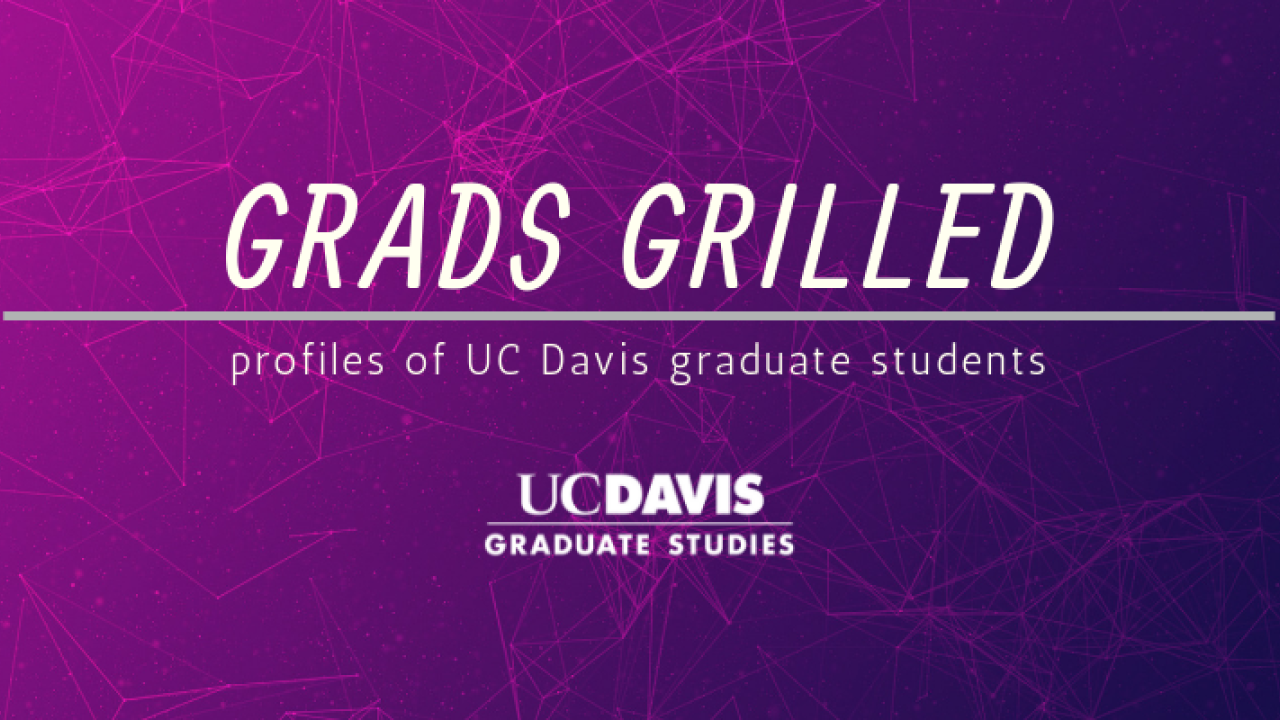
Graduate Student Profile: Alan Wong, Linguistics
Meet UC Davis Graduate Student Alan Wong
- Department
Linguistics
- Program and year of study
Ph.D., 3rd year
- Previous degrees and colleges
BA Philosophy and East Asian Languages and Cultures (double major), University of Southern California
- Where did you grow up?
Orange County, CA
- Where do you live now?
Central Davis
- What's your favorite spot in Davis?
Places with eduroam + coffee (CoHo, Silo, Raja’s Tandoor, Student Community Center, etc.)
- How do you relax?
Reading, exercising, conversations, studying foreign languages, playing and listening to music, video games, eating and drinking with friends
- What was the last book you read for pleasure?
The Practicing Mind: Developing Focus and Discipline in Your Life by Thomas M. Sterner (2012)
- What was the last film you saw at the theater?
Arrival
- Research interests
Language change – how do languages influence one another? How do languages change over time? Why does this happen?
- Dissertation title or topic
Corpora (large collections of text) from the Internet are a rich source of a relatively new kind of linguistic data. I’m interested in how interactions with text influence language and cognition.
- Please share a surprising or noteworthy fact or finding from your research
Different languages, and the scripts used to write them, pose different challenges to researchers. For example, in English, most people have a pretty solid intuition about what a ‘word’ is. When we write, words are typically divided by spaces. This isn’t the case for other languages, such as Chinese and Japanese, though.
- Which professor or class inspired you to pursue graduate studies?
In the senior year of my undergraduate studies, I took a history seminar on modern Chinese history with Prof. Brett Sheehan at the University of Southern California. It was through this course that I first began to think deeply about how knowledge is assembled. Particularly, this course taught me to think critically about sources, and how conclusions researchers draw from them become ‘fact’.
- Which scholarly text do you wish you had written? Why?
Though perhaps not a ‘text’ as we normally use the word, I wish I was one of the developers of UNIX. The Unix philosophy is to: “Write programs that do one thing and do it well. Write programs to work together. Write programs to handle text streams, because that is a universal interface” (Salus 1994). I think many of the ideals and principles underlying the development of Unix are applicable not just to software development, but to research methodologies and beyond. Unix not only underlies some really cool technologies, it is backed by a lot of powerful ideas as we
- What's the best thing about being a grad student?
Perhaps most importantly, I’m in an environment where I am constantly being pushed to learn and develop further as a researcher and as a human being. Additionally, being at UCD offers many opportunities which are hard to come by in the ‘working world’. For example, I am a leader of Japanese Conversation Club (Kaiwa Hour), which meets weekly on campus.
- What's the worst?
Being surrounded by opportunities means having to saying ‘no’ to many of them. Being in grad school, I realize more and more how finite our resources (time and attention, mainly) are.
- If you weren't a grad student, what would you be doing?
Working a job that allows me to work on interesting problems.
- Finally, please ask yourself a question - "What do you think is the greatest human invention of all time, and why?"
It has to be writing! By taking something temporal and putting it on a durable medium (e.g. paper, stone), we are able to transcend time and space. Through writing, we can build on the past work of others, as well as pass on knowledge to future generations. If we include other forms of symbolic representation as forms of writing, such as musical and mathematical notation, the impact of writing on human civilization goes even further.
Graduate student profile courtesy of the UC Davis College of Letters and Science.
About Graduate Studies
Graduate Studies at UC Davis includes over 100 dynamic degree programs and a diverse and interactive student body from around the world. Known for our state-of-the-art research facilities, productive laboratories and progressive spirit – UC Davis offers collaborative and interdisciplinary curricula through graduate groups and designated emphasis options, bringing students and faculty of different academic disciplines together to address real-world challenges.
UC Davis graduate students and postdoctoral scholars become leaders in their fields: researchers, teachers, politicians, mentors and entrepreneurs. They go on to guide, define and impact change within our global community.
For information on Graduate Studies’ current strategic initiatives, visit the Graduate Studies strategic plan page.
